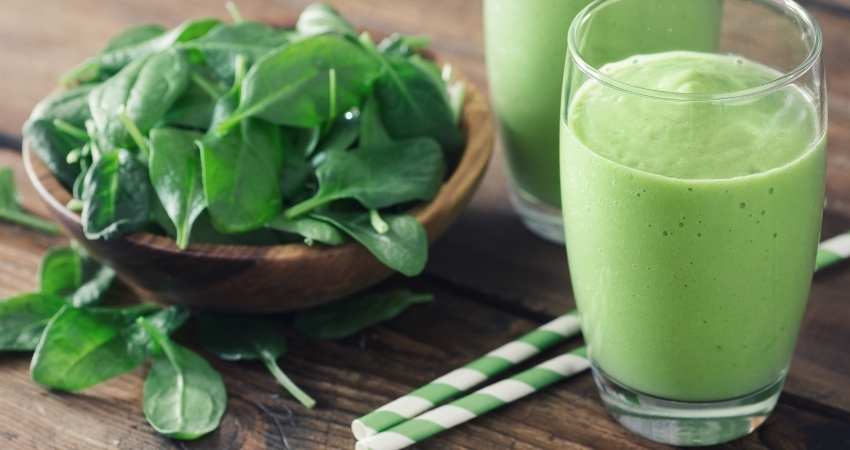Benefits of Spinach
Many believe that “superfoods” like spinach can also slow down the aging process naturally. So, what are the benefits of spinach?
The nutritional value of spinach may help contribute to anti-aging health benefits. Spinach contains a significant percentage of vitamin A, vitamin C, vitamin E and B6. Many of the nutrients have been proven in scientific studies to help tighten skin, lower blood pressure, improve the immune system and reduce the risk of certain disorders.
Spinach is perhaps one of the healthiest foods that you can add to your diet. As a Certified Health Coach people ask me about it all the time. I have researched the topic in the past and present. So, let’s first go over how the nutritional value of spinach helps with health.
The Nutritional Value of Spinach

A single serving of spinach weighs about 100 grams and only has 23 calories. The combination of low calories and high nutritional value (vitamins and minerals) is what makes spinach1 a top contender as a “superfood.”
Here’s a glimpse at the most important nutrients you’ll find in every 100-gram serving of spinach2. For reference, “DV” means “Percent Daily Value,” which describes what percentage of the daily recommended intake you’re getting for each nutrient:
- Vitamin A: 59% of DV
- Vitamin B6: 15% of DV
- Vitamin C: 34% of DV
- Vitamin E: 13% of DV
- Vitamin K: 460% of DV
- Folate: 49% of DV
- Manganese: 43% of DV
Though each of these micronutrients plays a pivotal role in your overall health, a few of these actually boasts antioxidants.
As free radicals begin rapidly spreading inside your body, the cells within your body are at risk for becoming damaged3. In the long-term, this damage can lead to the development of severe medical conditions.
The problem is that free radicals are difficult to prevent. Some are preventable by avoiding things like harmful toxins and pollution, but you might actually be exposed to others via your food or water sources.
Antioxidants work to fight and reduce the presence of these free radicals in your body. That’s why it’s incredibly important to load up on antioxidants with a balanced diet.
In spinach, antioxidants are present in the form of vitamins C, E, and A ((National Center for Biotechnology Information: Defining Powerhouse Fruits and Vegetables: A Nutrient Dense Approach)). But, they’re also seen in the form of carotenoids like lutein and zeaxanthin.
Spinach made my list of 21 Best Anti-Aging vegetables, the three listed are not common household names. You can find out what they are by clicking here, 21 Best Anti-Aging Vegetables for a Healthier You.

Vitamin C
Vitamin C is truly one of the most important vitamins in your body. You might already know about vitamin C’s benefits when it comes to building up your immune system and reducing your chances of getting sick.
But, vitamin C also plays a huge role in skin health4.
That’s because vitamin C is known to boost collagen production within the skin. These higher collagen levels can help to tighten and strengthen your skin, which ultimately may help reduce the wrinkles that come along with aging.
Vitamin C may also reduce damage that comes with UV sun exposure. That means vitamin C may lower your risk of developing brown spots on your skin. In one study, 10 patients were treated with a vitamin C on one side of their face and an inactive gel on the other side.
After twelve weeks, the vitamin C side had decreased photo aging scores, increased collagen and improved hydration5
Vitamin E
The vitamin E levels in spinach aren’t all that high, but they do still play a role in improving your health. In fact, getting enough vitamin E (with the help of spinach) can actually help you to reduce your risk of developing degenerative disorders6 that come with age.
This was discovered in a study that was conducted in 20117. After a ten year experimental period, the researchers recognized the older individuals supplementing with higher levels of vitamin E had a 25% lower risk of developing dementia.
However, it’s important to note that researchers have not yet found these results to be “significant.” Further research needs to be done in this area.
Vitamin A
Along the same lines as vitamin C, vitamin A (retinol) also has the potential to reduce the aging effects typical in the skin8.
Just like vitamin C, vitamin A can help to strengthen and tighten your skin as a result of greater collagen production. This can effectively reduce those fine lines and wrinkles that typically come with the aging process.
Brown spots caused by the sun’s rays may also be reduced with the help of vitamin A.
Most importantly, vitamin A can actually encourage your body to rebuild the outer layer of the skin. This can help to get rid of dead and damaged skin while also making way for much healthier skin.
Lutein & Zeaxanthin
What you might not know about dark leafy greens like spinach is that they’re also full of something called “carotenoids.” In addition to targeting just about every area of your health, both lutein and zeaxanthin target mostly vision health.
That’s because both of these carotenoids reduce the inflammatory responses within the body, particularly within the eyes9. They can also help to protect the eyes (specifically the retinas) from harmful light waves10.
In the process, lutein and zeaxanthin can work to try and lower your risk of age-related macular degeneration, also known as AMD. This condition usually comes as a result of age or even exposure to UV light.
AMD negatively impacts the clarity of your vision. You might be able to see objects, but the tiny details are much less clear. If left untreated, macular degeneration can eventually lead to blindness.

Oxidative Stress and Exercise
Many people who exercise are always looking for a supplement to help them recover or build muscle. I bet most never thought about using real spinach. Twenty men consumed spinach supplementation for 14 days before running. After supplementation, their total antioxidant capacity elevated significantly.
The researchers concluded spinach supplementation improved oxidative stress and muscle damage following a half-marathon11.
Blood Pressure
I hear it all the time and it’s true, a diet rich in fruits and vegetables can benefit your heart and blood pressure. Spinach, a high nitrate source, was used in a test of 27 people to examine its effect on arterial stiffness and blood pressure.
After seven days of consuming spinach every day, systolic pressure decreased 3.48 mmHg and diastolic 2.60 mmHg12.
Cardiovascular Disease
In addition to blood pressure, other cardiovascular diseases are a leading cause of death. Cardiovascular diseases include the following:
- Blood pressure
- Heart attack
- Stroke
- Heart disease
- Heart failure
- Heart valve problems
- Coronary artery disease
- Arrhythmia
- Peripheral artery disease
A research report noted 14 different studies that reported an inverse relationship between intake of leafy green vegetables and cardiovascular diseases13. The most common vegetables included in the study were spinach and lettuce.
If you have any questions to ask me about this article don’t hesitate to comment below or email us. You can find an email on our contact page.
Read Next – More Anti-Aging Foods!
- National Center for Biotechnology Information: Functional properties of spinach (Spinach oleracea L.) phytochemical and bioactives [↩]
- Wikipedia: Spinach [↩]
- National Center for Biotechnology Information: Free Radicals, antioxidants and functional foods: Impact on Human Health [↩]
- National Center for Biotechnology Information: The Roles of Vitamin C in Skin Health [↩]
- National Center for Biotechnology Information: Double-blind, half-face study comparing topical vitamin C and vehicle for rejuvenation of photo damage [↩]
- National Center for Biotechnology Information: Review of Neurological-nutrition Used as Anti-Alzheimer Plant, Spinach, Spinach oleracea [↩]
- National Center for Biotechnology Information: Dietary antioxidants and long-term risk of dementia [↩]
- National Center for Biotechnology Information: Retinoids: active molecules influencing skin structure formation in cosmetic and dermatological treatments [↩]
- National Center for Biotechnology Information: The Effect of Lutein on Eye and Extra-Eye Health [↩]
- American Optometric Association: Diet and Nutrition [↩]
- National Center for Biotechnology Information: The effect of spinach supplementation on exercise-induced oxidative stress [↩]
- National Center for Biotechnology Information: Effect of Spinach, a High Dietary Nitrate Source, on Arterial Stiffness and Related Hemodynamic Measures: A Randomized, Controlled Trial in Healthy Adults [↩]
- National Center for Biotechnology Information: Cardiovascular Health Benefits of Specific Vegetable Types: A Narrative Review [↩]
